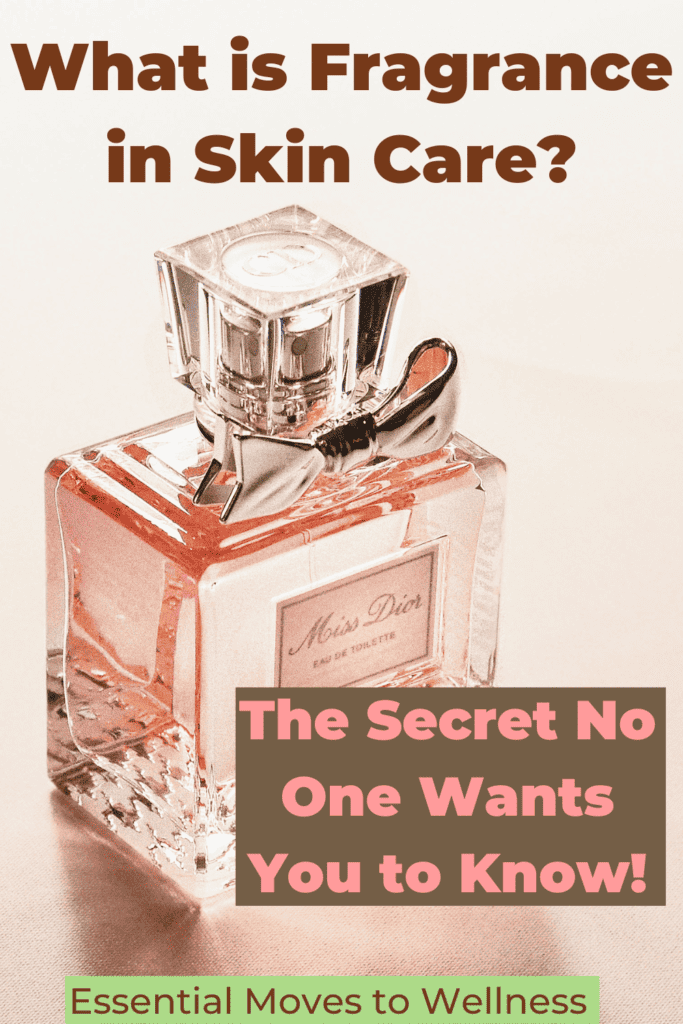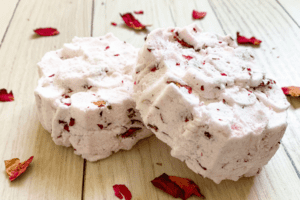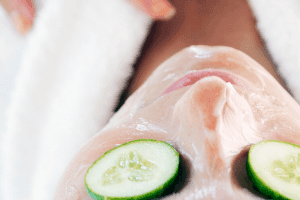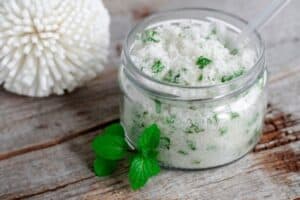What is Fragrance in Skin Care? A Guide to Synthetic and Natural Scents
What does “fragrance” mean on ingredient lists? It’s something the cosmetics industry is trying to hide.
Fragrance is a term that is often used in the skincare industry. But what is fragrance in skin care?
It refers to the scent that is added to skincare products to enhance their appeal. Fragrances are used in a variety of skincare products, ranging from lotions and creams to serums and masks.
While fragrances are often associated with perfumes and colognes, they play an essential role in skincare as well.
Fragrances in skincare products can be derived from natural or synthetic sources. Natural fragrances are extracted from plants, flowers, and other natural sources. Synthetic fragrances, on the other hand, are created in a laboratory.
Neither of them are good for your health!
Both types of fragrances are used in skincare products, and they can have different effects on the skin. While fragrances can add a pleasant scent to skincare products, they also have potential concerns.
Read on to learn why any ingredient list with “fragrance” gets an automatic “no” from me!
This post contains affiliate links. You can learn more here.
Pin this image for later!

Key Takeaways
- Fragrances play an essential role in conventional skincare products and can be derived from natural or synthetic sources.
- Fragrances pose major concerns for the skin and overall health due to lack of transparency.
- It is important to avoid products that contain anything along the lines of “fragrance” and be aware of regulations and labeling requirements.
The Role of “Fragrance” in Skin Care

Fragrance is a vital component of skin care products. Its purpose is to enhance the sensory experience of using the product and to provide a pleasing aroma.
Fragrance can be derived from natural or synthetic sources and can be added to a variety of skin care products, including cleansers, moisturizers, and serums.
But why do ingredient lists include one little not-so-specific word for what is clearly several ingredients? I can answer that in one word: secrecy.
Companies like to keep the fragrance component of their products a trade secret, so it is perfectly legal to “hide” the fragrance ingredients in a product with zero repercussions.
The only problem is, there are no regulations to what goes into a products fragrance component! A company can put whatever they want in their product’s fragrance, and there’s no “higher power” that can tell them otherwise.
The only repercussions a company could face is a number of people having a bad reaction to the product and seeking legal action as a result. Which has happened. Several times, in fact.
I talk about it a bit more in detail in my clean beauty ebook here. I even dissect a product that fooled me really good and later faced legal charges.
With that said, let’s learn how to find this sneaky ingredient in your beauty products.
Types of Fragrances in Skin Care

Fragrances are added to skincare products to provide a pleasant scent. However, some fragrances can cause skin irritation or allergic reactions.
Therefore, it is important to understand the types of fragrances used in skincare products to make an informed decision about which products to use.
Natural Fragrances
Natural fragrances are derived from plant-based sources, such as essential oils. They are usually considered a safer alternative to synthetic fragrances because they are less likely to cause skin irritation.
However, just because they started out natural doesn’t mean they are natural in the end. Yes, a product’s natural fragrance may be based on essential oils for example, but the oil has been through so much processing that it can’t even be considered an essential oil anymore.
If you see “natural fragrance” or any variation of that on an ingredient list, that means that the fragrance’s ingredient are of natural origin. But there’s absolutely no way to know what’s in the product’s fragrance when you buy it.
For that reason, it’s a no from me.
Synthetic Fragrances
Synthetic fragrances are man-made fragrances that mimic the scent of natural fragrances. They are often used in skincare products because they are cheaper and provide a wider range of scents.
However, they are more likely to cause skin irritation or allergic reactions. Some common synthetic fragrances used in skincare products include phthalates, parabens, and formaldehyde.
This is the most common type of “fragrance” you see on ingredient lists. Avoid this at all costs!
Fragrance-Free Options
Fragrance-free skincare products do not contain any added fragrances. They are a good option for people with sensitive skin or those who are prone to allergic reactions.
Fragrance-free products may still have a natural scent from the ingredients used, but they do not have any added fragrances.
Understanding the types of fragrances used in skincare products is important for making an informed decision about which products to use. If you really like a particular product that contains fragrance, look to see if there’s a fragrance-free alternative!
Potential Concerns with Fragrances

Fragrances are commonly added to skincare products to enhance their scent and appeal. However, there are potential concerns associated with the use of fragrances in skincare products. The following sections outline some of the potential concerns with fragrances.
Skin Sensitivity
Fragrances can cause skin sensitivity, especially for people with sensitive skin. Skin sensitivity can manifest as redness, itching, and dryness.
In fact, fragrance in skin care is often the cause of sensitive skin! You’d be amazed how you feel when all of your skin care products no longer contain nasty chemicals.
People with sensitive skin should avoid skincare products with fragrances to prevent skin sensitivity. Give your skin a chance to heal for a bit!
Allergic Reactions
Fragrances can also cause allergic reactions in some people. Allergic reactions can manifest as hives, swelling, and difficulty breathing.
You can also experience headaches and hormone disruption from fragrance as well. Just about every bad ingredient you’re trying to avoid can be found in fragrance!
People with a history of allergies should avoid skincare products with fragrances to prevent allergic reactions.
Irritation and Dermatitis
Fragrances can also cause skin irritation and dermatitis. Skin irritation can manifest as redness, itching, and burning.
Dermatitis can manifest as a rash, blisters, and peeling skin. People with a history of skin irritation and dermatitis should avoid skincare products with fragrances to prevent skin irritation and dermatitis.
Regulations and Labeling of Fragrances

FDA Guidelines
The FDA doesn’t have as much power in regulating cosmetics as it does with regulating food (and even that is questionable). Because of this, the FDA leaves safety concerns up to each individual company.
They even say right there on their website: “Companies and individuals who manufacture or market cosmetics have a legal responsibility for ensuring that their products are safe and properly labeled.“
Translation: you can put whatever you want in your products, just make sure your customers don’t find out and pursue legal action.
Remember that it’s perfectly legal for companies to cover up the fragrance component of a product with just that one word, and there’s no way to know what’s actually in there.
INCI Naming
The International Nomenclature of Cosmetic Ingredients (INCI) is a standardized system used to name ingredients in skin care products, including fragrances. INCI names are required on product labels to ensure consistency and transparency in ingredient labeling.
Fragrance ingredients are listed on product labels using the term “fragrance” or “parfum,” followed by the INCI name of the individual fragrance components. However, as mentioned earlier, the exact composition of the fragrance is not required to be disclosed.
Consumer Transparency
Many consumers are concerned about the safety and transparency of fragrance ingredients in skin care products. To address these concerns, some manufacturers are voluntarily providing more detailed information about their fragrance ingredients on product labels or websites.
For example, some companies disclose the specific fragrance components used in their products and provide information on the safety and potential allergenicity of those ingredients.
Overall, regulations and labeling requirements have a long way to go ensure the safety of their customers. By providing clear and accurate information about fragrance ingredients, manufacturers can help consumers make informed decisions about the products they use on their skin.
But that’s why you’re here reading this article! You want to learn how to control exactly what you put on your body every single day. And I’m happy to help 🙂
How to (Mostly) Avoid Fragranced Skin Care

When it comes to choosing skin care products, it’s important to consider a few factors to ensure that you’re getting the best product for your skin type. Here are some tips to help you choose the right skin care for you and your situation.
Understanding Clean Beauty as a Spectrum
Since there are little to no regulations within the cosmetics industry, clean beauty is a very subjective term. What’s “clean” to me might not be clean to you, or vice versa. And that’s okay!
I tend to fall more on the strict end of the spectrum when it comes to clean beauty because I’m passionate about it and it’s literally my job, but that doesn’t mean you have to be as strict as me.
If you prefer to avoid a few toxic ingredients and call it good, that’s great! You’re still doing your long-term health a huge favor. And I’ll let you in on a little secret when it comes to fragranced skin care products:
How to Spot “Low Fragranced” Products
Did you know that where an ingredient lands on the list determines the volume of it within the product? For example, if you see “water” towards the top of the list, that means that the product is mostly made of water.
If you really love a particular product but don’t want the fragrance, look where it is on the ingredient list. If it’s towards the bottom, or better yet, the last item on the list, then it’s only in trace amounts and might not cause any irritation.
Choosing products that work for you are a very personal choice, so as long as you’re informed, you’re empowered!
Patch Testing
It’s always a good idea to patch test a new product before using it all over your face or body.
This involves applying a small amount of the product to a small area of your skin, such as your inner arm or behind your ear, and waiting 24-48 hours to see if any irritation or allergic reactions occur. If you experience any redness, itching, or swelling, it’s best to avoid using the product altogether.
If you do decide to buy a product with fragrance, just be mindful of how you feel when you do a patch test.
What is Fragrance in Skin Care Now?

Natural and Organic Trends
In recent years, there has been a growing trend towards using natural and organic ingredients in skin care products, including fragrances.
Consumers are becoming increasingly aware of the potential harm that synthetic fragrances can cause, such as skin irritation and allergic reactions. As a result, many are turning to ingredient transparency.
Sustainable and Ethical Practices
Sustainability and ethical practices are also becoming increasingly important in the fragrance and skin care industry.
Consumers are looking for products that are produced using sustainable and ethical practices, such as using renewable energy sources and minimizing waste.
Additionally, many consumers are concerned about the impact that the fragrance industry has on the environment, such as the use of animal testing and the disposal of harmful chemicals. As a result, many companies are now adopting more sustainable and ethical practices in order to meet the demands of their customers.
Frequently Asked Questions

Can fragrance in skincare products cause irritation or allergic reactions?
Yes, fragrance in skincare products can cause irritation or allergic reactions, especially for those with sensitive skin.
Fragrances are often made up of a complex mixture of chemicals, some of which can be irritating or allergenic to certain individuals. It’s important to patch test any new skincare products that contain fragrance and to discontinue use if any irritation or allergic reaction occurs.
What are the benefits of using fragrance-free skincare products?
Using fragrance-free skincare products can be beneficial for those with sensitive skin or those who are prone to allergic reactions. Or really for anyone!
Fragrance-free products are less likely to cause irritation or allergic reactions and can help to maintain the skin’s natural balance.
How can natural fragrances affect the skin differently than synthetic ones?
Natural fragrances are derived from plant extracts and essential oils, while synthetic fragrances are created in a lab.
However, natural fragrances can also be irritating or allergenic to certain individuals, just like synthetic fragrances. So they aren’t really that different at all.
Are there any skin types that should avoid fragranced skincare products?
Ideally, everyone should avoid fragrance in skin care products. But having it in small amount *might* be okay. Make sure to patch test first!
Those with sensitive skin or those who are prone to allergic reactions should avoid fragranced skincare products. It’s also important to note that certain skin conditions, such as eczema or rosacea, can be aggravated by fragrances.
What should I look for on the ingredient list to identify fragrances in skincare?
Fragrances can be listed on ingredient lists under a variety of names, such as “parfum” or “fragrance”. Look for these terms on the ingredient list to identify fragrances in skincare products.
How does the inclusion of fragrance impact the overall effectiveness of skincare products?
The inclusion of fragrance does not necessarily impact the overall effectiveness of skincare products. However, it’s important to note that fragrance is often added to mask the scent of other ingredients and is not necessary for the product to be effective. In some cases, fragrance can even decrease the effectiveness of certain ingredients by causing irritation or allergic reactions.
Before You Go!
If you want to learn even more about how to read ingredient lists and becoming your own clean beauty guru, you need to check out my clean beauty ebook!
I wrote Essential Moves to Clean Beauty as a crash course of bite-sized pieces of information. It’s the resource I wish I had when I first started my clean beauty journey.
Click the button below to shop my ebook!







